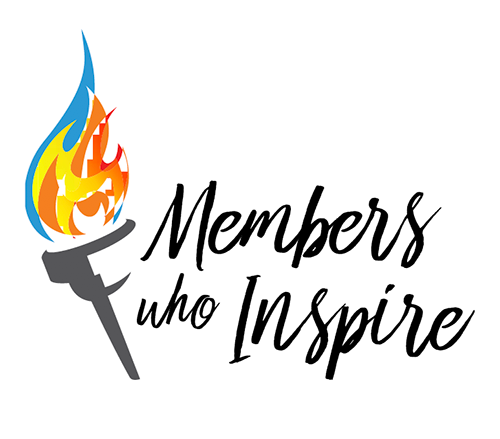August Hieber helps create access to legal services for older LGBT adults

August Hieber, who uses they/them pronouns, has focused their legal career on assisting senior citizens who are part of the LGBT community.
August Hieber learned early that people who are different are treated differently.
They grew up in Dayton, Ohio, with a younger brother who has muscular dystrophy and uses a wheelchair. Their elementary school wasn’t accessible to him—unless he used a ramp by the dumpsters on the side of the building.
“The school was like, ‘You guys can use the trash ramp to come into the school,’ and I remember just thinking, ‘What type of message is that sending to disabled children?’ ” says Hieber, who also learned about the power of advocacy after their family successfully pushed to have an elevator installed.
Hieber carried those lessons to law school, hoping to help other people who were marginalized because of their identities. In 2017, after their first year at the Chicago-Kent College of Law, they served as a summer intern in the Equal Justice Works AmeriCorps JD Program and worked with the Legal Aid Society of Metropolitan Family Services in Chicago to provide outreach and assistance to clients who were 60 or older.
They felt drawn to elder law and wanted to not only advocate for older adults with disabilities but also older adults who are lesbian, gay, bisexual or transgender.
“I take a lot of my own identity into my work,” Hieber says. “I am a trans person. I am nonbinary. And I remember being like, ‘I love doing this work. This feels really good. But how come I’m not seeing any clients that have similar identities and experiences to mine? Why are we not seeing trans older adults in this practice?’”
Hieber also served as a volunteer education ambassador for the National Resource Center on LGBT Aging and realized through research that LGBT older adults are less likely to access legal and social services because of past experiences with invalidation and discrimination.
To address the disparity, Hieber created Proud to Thrive, the first program in Chicago specifically designed to provide culturally responsive legal advocacy to this population.

“The project they developed was just the perfect combination of the interests and passions they brought with them to law school,” says Michelle Vodenik, Chicago-Kent’s senior director of public interest law & pro bono initiatives, who served as Hieber’s career adviser. “Even throughout law school, I saw August becoming active nationally on elder justice initiatives.
“They have incredible enthusiasm for making an impact and a realization that you can do great work and great things in your life as a lawyer.”
Meeting the need
Hieber approached the Center for Disability & Elder Law in Chicago—where they spent much of their third year of law school as an intern drafting simple wills, powers of attorney and petitions for guardianship—with the proposal for Proud to Thrive.
Through a two-year Equal Justice Works fellowship, they planned to help CDEL assist low-income LGBT older adults with civil legal issues, such as estate planning and housing matters, at mobile clinics in geographically and physically accessible locations across the city.
But not long after Hieber graduated from Chicago-Kent and initiated the program in 2019, the COVID-19 pandemic hit and changed their plans.
“I wanted to create a place where people could go to address their legal needs no matter where they lived,” Hieber says. “Then when things went virtual that was less of a concern, and it was more, ‘How am I reaching communities to let them know I exist?’”
Hieber focused on outreach with community partners, including Pride Action Tank, a project of the AIDS Foundation of Chicago. During one of their events, nine of the nearly 50 older adults who attended said they needed legal assistance.
The next month, Hieber organized a special pro bono clinic where they worked with partners from two law firms and law students to provide services to those individuals.
Hieber continued to offer one-on-one legal services to any LGBT older adult who heard about Proud to Thrive. They remember one client who had problems with his landlord but wasn’t yet facing eviction. He needed information about his options, but he also needed someone to hear his story.
“I realized he was really lonely, he was really isolated and in a really stressful situation,” Hieber says. “My advocacy in that moment was not what I could achieve for him; it was just being there for him in this hard time.”
Hieber pivoted during the pandemic to also teach legal professionals how to create culturally responsive services for LGBT older adults. Their training, which they presented to more than 500 people, covered a wide range of topics, including which acronym to use (many older adults avoid LGBTQ because they consider “queer” a slur, they say) and how to facilitate access to LGBT community resources.
“What August did was help open a lot of doors for CDEL as an organization to new community partners, and they also strengthened relationships with existing partners,” Executive Director Caroline Manley says. “They also had a huge impact on our staff and our organization overall as well in terms of the attention they brought to the LGBT community both internally and externally.”
Additionally, Hieber worked with CDEL on legislative advocacy after recognizing problems they encountered with a few of their clients affected a larger number of LGBT older adults.
As one example, Hieber drafted an ordinance to reduce the cost of recording a transfer on death instrument—an estate-planning tool that allows homeowners to name a beneficiary to their home upon their death—at the beginning of the COVID-19 pandemic. The Cook County Board of Commissioners passed it in May 2020.
Hieber, a recipient of the ABA Young Lawyers Division’s 2021 On the Rise Award, enjoys helping LGBT older adults because they say it feels like securing their own future.
“Taking care of a community’s elders is a testament to the resilience of a community,” says Hieber, who also serves on the Commission on Sexual Orientation and Gender Identity. “It was really gratifying and satisfying because I was investing in my future and the future for people like me.”
Deep impact
After their Equal Justice Works fellowship, Hieber decided to help inspire change on a greater scale.
In September, they became the manager of programs and advocacy at the Chicago Bar Foundation, where they focus in large part on making court processes more accessible. Hieber is working to pass legislation that would reform Illinois’ name-change law, which is one of the most restrictive in the country.
Hieber is also organizing listening sessions to hear from community members on how courts fare in three areas: disability accommodations, mental health resources and LGBT access. They plan to use this feedback to create a targeted policy agenda.
“I was discussing this with my supervisor, and she was like, ‘Why don’t you combine your interests in disability and LGBT access and then question, what does accessibility mean and look like to different people trying to access the courts?’” Hieber says. “I’ve been given a lot of ability to pursue this inquiry where it goes, which is really cool.”
Hieber spends most of their free time with their partner, Amanda, who currently works as an Equal Justice Works fellow at CDEL, and their cat, Buddho. They also prioritize self-care, which for them includes therapy, hiking and practicing mindfulness.
Members Who Inspire is an ABA Journal series profiling exceptional ABA members. If you know members who do unique and important work, you can nominate them for this series by emailing [email protected].
Write a letter to the editor, share a story tip or update, or report an error.


